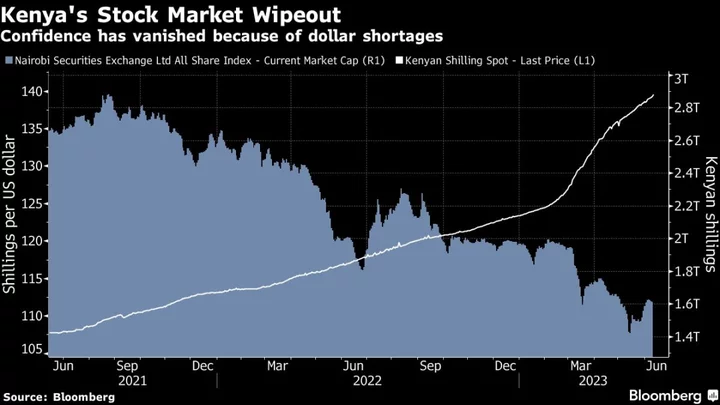Kenya’s crippling dollar shortage is driving away investors, turning a once-booming stock market into the worst in the world.
Nairobi’s All-Share Index has plunged 19% this year, the steepest drop among the almost 100 global indexes tracked by Bloomberg. The nation is in the grip of a foreign-exchange crunch, with major companies and investment firms facing weeks of delay to repatriate dividends and capital gains.
Kenya, the second-biggest economy in East Africa, has struggled with soaring food and energy prices that have strained government finances and caused the currency to crater. Central bank reserves dwindled to the lowest in 11 years, forcing importers to scrabble for dollars.
While many countries in sub-Saharan Africa have faced similar economic hardships, Kenya stands out because just a few years ago it boasted a small, but vibrant stock market — one of the few to lure fund managers from overseas. But now, they’re fleeing as fast as they can.
“Foreign investors are not comfortable when there is a waiting period to get money out,” said Rami Hajjar, a Cape Town-based fund manager at Allan Gray Ltd. Kenya accounts for 6% of his equity fund that invests in African shares excluding South Africa.
Trading statistics show a market that investors are leaving in droves. Foreigners sold a net of 1.69 billion shillings ($12.1 million) of shares in the first three months of 2023, a 73% increase from a year earlier, according to data from the markets regulator.
The proportion of non-residents in equity trading was 41% in the first quarter of 2023, compared with 62% in the second quarter of last year.
It’s a turnaround from the stock market’s heyday, when the Nairobi index soared more than 250% from 2009 to 2018. While the benchmark still has major companies with foreign ownership, including Safaricom Plc, KCB Group Plc and East African Breweries Plc, it’s down 45% from the 2021 peak.
Authorities say they are trying to alleviate dollar shortages by allowing the Kenya shilling to trade more freely. Incoming central bank governor Kamau Thugge has pledged to consider issuing domestic dollar bonds to boost liquidity in its foreign-exchange market.
More money is also set to flow into Kenya in the form of financing from the International Monetary Fund and World Bank.
Read More: IMF Poised to Expand Kenya Loan Program by 45% to $3.5 Billion
Representatives at the Kenyan central bank and stock exchange didn’t respond to a request for comment.
Still, Kenya’s biggest companies are under pressure. Vimal Shah, chairman of consumer goods manufacturer Bidco Africa Ltd, said the firm has to find other sources for dollars. “Even from the banks today we don’t get any flows. They’re still selling $5,000, $10,000, $2,000 — small amounts,” he said.
Safaricom, which is part owned by South Africa’s Vodacom Group and Britain’s Vodafone Plc, has also highlighted the challenge. “There has been some difficulty in taking the dividends out, which then puts a little bit of pressure on some of the funds that are holding these shares,” Chairman Adil Khawaja said at an investor briefing.
Trading volumes have also dried up. Average daily volume in stocks is about half the levels from a year ago, and bond market turnover dropped 15% in the first three months of 2023.
Investors acknowledge dollar backlogs are down from last year’s extremes. Muathi Kilonzo, head of Kenyan equities at the brokerage EFG Hermes, said some of his clients waited seven months before being able to withdraw their cash.
The delay is now roughly a month, but rather than boosting confidence, that’s given them an extra incentive to bail out. “The first thing they do is pull the trigger on a sell because now they think they can get their money sooner,” he said.
In the eyes of Thys Louw, a portfolio manager at Ninety One UK Ltd, there’s a slim chance foreign investors will return soon. He exited shilling bonds at the end of 2021.
“We place high value on liquidity and how easy it is to go in and out of the market,” Louw said. “The cost of being stuck in a country and not being able to repatriate capital is very high.”
--With assistance from Bella Genga, David Herbling and Robert Brand.

